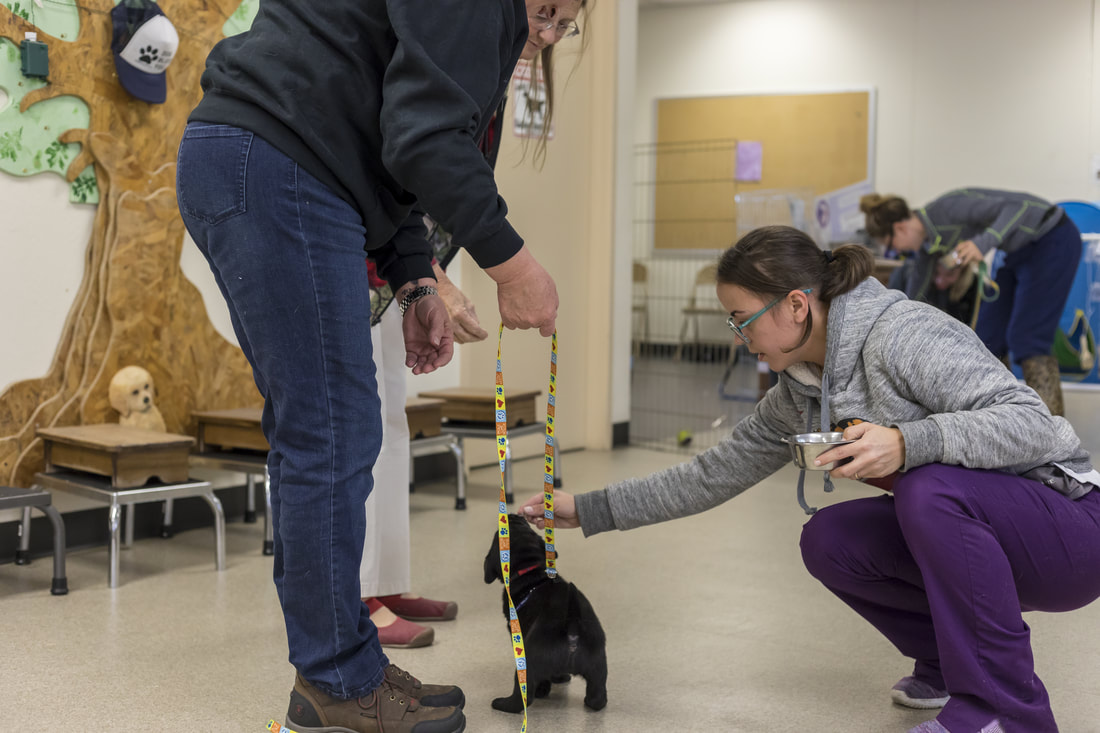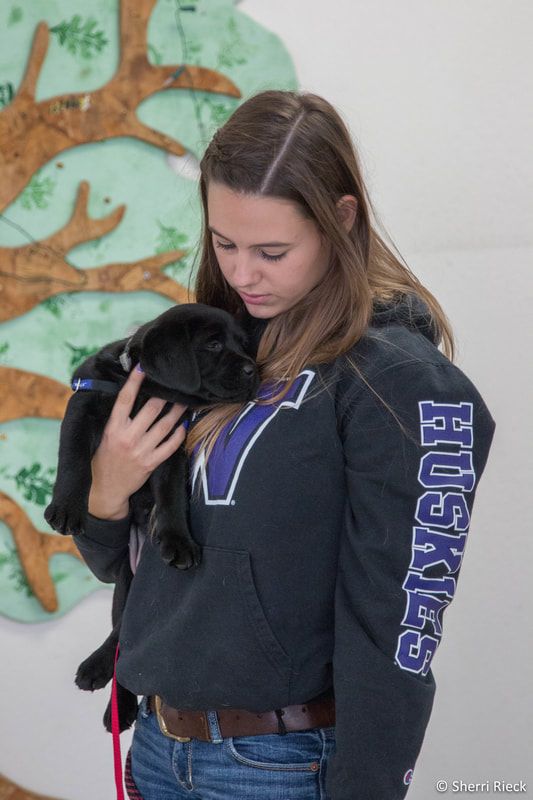Associate of Science in Assistance Dog Education
|
Associate of Science in Assistance Dog Education. The mission of the Assistance Dog Education A.S degree program is to prepare students for careers in the service, facility, canine therapy and affiliated assistance dog related fields by educating them in the basic concepts, knowledge, and applied skills consistent with the science and application of assistance dogs, and/or for the pursuit of advanced degrees in canine studies having provided them a solid foundation in dog handling and training.
|
|
|
|
View a short clip of students running a training session during client training! |
Arrows may not center when in edit mode. Once site is published, the arrow will be centered on the tab
When the site is published, this border and note will not show up.
Drag & drop your tab 1 content here
-
Overview
The associate degree programs start once a year, at the beginning of the fall semester. The program requires that students attend courses onsite at Bergin College for two semesters — the fall and spring semesters.
Admission and credit transfer requirements are identical for each program.
Note: Degree students are required to take each semester’s assigned dog home evenings and weekends as a part of their homework hours. The assigned dogs, of differing breeds, personalities and ages, must be housed, fed, exercised, trained and taken on outings. The school provides all equipment and supplies needed. Extenuating circumstances will be taken into consideration and other means of meeting this requirement may be arranged. *Accredited universities and colleges require a minimum of 2 hrs. of homework for each course credit hour.
-
Objectives
Program Educational Objectives for AS in Assistance Dog Education
1. To encourage in students an interest to explore and expand the dog’s role in professional and pre-professional human health care and human service fields;
2. To develop a depth of knowledge in the ways dogs have served and currently serve humanity;
3. To utilize research from the scientific community to further assistance dog studies and assistance dog program development;
4. To prepare students to be marketing-savvy professionals who can develop effective print materials, movies, and websites to promote the goods and services of their own or of their employer’s assistance dog programs;
5. To prepare students to communicate effectively, to become proficient in relaying succinct and powerful messages to promote their assistance dog agency in a positive manner, and to effectively follow up with their contacts to ensure a favorable outcome for their assistance dog program.
6. To prepare students to ensure that assistance dogs they work with are an asset and an unobtrusive helpmate to their human partners.
-
Curriculum
Associate of Science in Assistance Dog Education Program Curriculum
The following courses are required for the Associate of Science in Assistance Dog Education degree program. See Course Descriptions in the College Catalog for more information.
LIF 110 - Intro to Human-Dog Psychology & Development (3 credits)
LIF 150 - Canine Health & Care (2.5 credits)
LIF 151 - Canine Health & Care Supervised Lab (.5 supervised lab credits)
LIF 235 - Career Considerations (.5 credits)
LIF 262 - Intro to Kennel Technology (1 credit)
LIF 263 - Kennel Technology Supervised Lab (.5 supervised lab credits)
ADE 220 - Disability Studies & Experience (2 credits)
ADE 225 - Intro to Assistance Dog Selection, Breeding & Whelping (2 credits: 1.5 lec, .5 lab)
ADE 230 - Intro to Service Dog Roles & Training (3 credits: 2.5 lec, .5 lab)
ADE 231 - Intro to Service Dog Training Supervised Lab (1.5 supervised lab credits)
ADE 235 - Intro to Affiliated Service Dog Roles & Training (1 credits: .5 lec, .5 lab)
ADE 236 - Intro to Affiliated Service Dog Training Supervised Lab (1 supervised lab credits)
ADE 244 - Intro to Remediating Problem Dogs (1.5 credits: 1 lec, .5 lab)
ADE 250 - Dog/Pup Parent & Pup Petter Management (1.5 credits)
ADE 255 - Assistance Dog Scent Detection Dog Roles & Training (2 credits: 1.5 lec, .5 lab)
ADE 256 - Assistance Dog Scent Detection Supervised Lab (.5 supervised lab credits)
ADE 260 - Intro to Non-Profit Business Management (2 credits)
ADE 265 - Intro to Non-Profit Fundraising & Marketing (2 credits)
ADE 270 - Assistance Dog Laws (1.5 credits)
ADE 280 – Intro to Assistance Dog Client Training (2.5 credits: 2 wks semester beginning/end)
ADE 282 - Assistance Dog Client Processing, Placement & Follow Up (1 credit)
ADE 285 - Assistance Dog Client Training (2.5 credits)
Drag & drop your tab 2 content here
Expected Learning
|
Students completing this AS degree will demonstrate:
|
I learned so much while there and made some wonderful lifelong friends that share my same passion. |
Drag & drop your tab 3 content here
Course Requirements
Bergin College's associate’s degree program requires that a student fulfill all or most of the programs’ General Education and Elective coursework through a process of enrolling in the courses at another college or postsecondary educational institution, then transferring the completed credits to Bergin College by means of an official transcript of record from the awarding institution. The following requirements apply to all credits and coursework transferred to Bergin College.
- Coursework must be taken at an institution of higher education accredited by an agency recognized by the U.S. Department of Education. Or, if transferring from a foreign institution, accredited by the equivalent of the country’s Department of Education.
- Coursework is verified by the submission of official academic transcript(s) of record from the awarding institution(s). Applicants request that the academic institution(s) from which they took the course work send copies of official transcripts directly to Bergin College's Office of Admissions.
- All transferred credits are calculated as semester credits. If the submitted transcript indicates that credits are based on quarters, then the credits will be converted to semester credits using the formula of 2/3 x quarter credits = semester credits.
- All transferable coursework is required to have a grade-point value of 2.0 (“C”) or better
- Bergin College does not award credit for prior experiential learning.
- Bergin College has no transfer or articulation agreements with other institutions.
- Coursework must be completed prior to enrollment. Note: An applicant who has not completed all transfer coursework may be permitted to enroll upon consultation with the Chief Academic Officer. However, no student can graduate from a program without fulfilling all coursework and credit requirements including transfer credits.
- At a minimum, 25 percent of the credits required for non-degree and undergraduate degree programs must be completed at Bergin College of Canine Studies.
Decisions on award of transfer credit is made by the Chief Academic Officer or assigned staff, in consultation with appropriate faculty. Academic credit awarded through “transfer” is not calculated in the overall cumulative GPA for coursework completed at Bergin College, nor is credit applicable toward confirmation of Satisfactory Academic Progress.
Associate degree transfer credits requirement (General Education):
- 21 credits of General Education coursework
- 3 credits of Elective coursework
- (24 total transfer credits)
ASSOCIATE OF SCIENCE: ADMISSION REQUIREMENTS
Drag & drop your tab 4 content here
How to Enroll
|
The full enrollment process and information are in the Admission section of our web site. There you will also find information regarding campus life, costs, and financial aid.
|
Drag & drop content here


